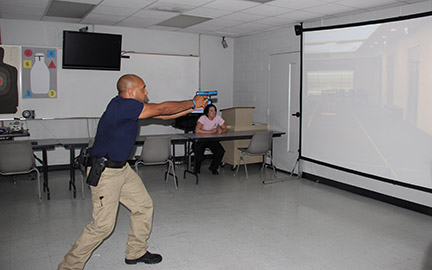Deadly force training for police cadets without firing a shot

It’s 3:16 a.m. when you are called to a domestic dispute at a home. First words fly, then a bottle soars through the air. Someone raises a gun. If you’re a police officer, what do you do?
A new simulator at College of the Mainland how help future police officers hone their responses when adrenaline surges and seconds matter.
“It’s real-life situations. It’s awesome,” said Stormy Gulley, a COM Basic Peace Officer Academy cadet in training. “When you give it commands, [people] talk back to you.”
The Ti Training simulator fills a 12-foot screen. On the computer, instructor Daniel Blackford controls scenarios based on the cadets’ commands. If cadets speak authoritatively, the suspect may drop a weapon; if they hesitate, the suspect may start shooting.
The simulator records whether students use pepper spray, fire a handgun and give commands, and tracks any shots fired, their location and their time.
It’s a useful discussion tool at a time when police use of force is under debate.
“Why did you shoot him?” range master and Blackford asked one cadet after a simulation.
“He pulled out a knife,” said the cadet.
“Everything isn’t a deadly force situation. You can use pepper spray,” said Blackford. “If at all possible, give a warning. You’re the police. People are counting on you.”
There are not always right answers to a scenario response, but individuals can discuss what they saw, how they responded and what the law says.
COM Police Chief Sylvia Chapa and others in the police department trained in responding to active shooter and other situations.
“It gets your adrenaline up. By two or three scenarios, you improved your skills. It sharpens our thought processes and our reaction times,” said Chapa. "No situation is ever going to be the same. [The simulator] in combination with Daniel’s experience and training, is a jewel for law enforcement. After [a scenario], he’s quizzing you, 'What are you able to do? What is your organization’s policy?’ It’s a good tool for civilians, law enforcement and security officers."
Civilians can also use the training in scenarios from potential car-jackings to home invasions. They can also practice on a target for the license-to-carry test.
“We can teach people how to shoot on the range all day. Teaching people to know when to shoot is different,” said Blackford. “It’s open to other agencies in the area. Nobody else in the area is doing this.”
Blackford can also film scenarios on campus and upload them to customize the program.
“It’s a training tool. A situation can turn on you in the blink of an eye,” said Blackford. “For someone who hasn’t shot, this gives us the chance to practice without firing a round.”
For more information on open range times and handgun classes, call 409-933-8485.
